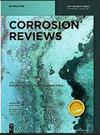基于密度泛函理论的有机化合物缓蚀性能及理论计算
IF 3.2
4区 材料科学
Q3 ELECTROCHEMISTRY
引用次数: 0
摘要
摘要通过测量E HOMO、E LUMO、带隙能、柔软性、硬度、亲电性、亲核性和Fukui函数分析等量子化学参数,对2,5-二(4-二甲氨基苯基)-1,3,4-恶二唑(DAPO)、2-乙酰噻吩硫代氨基脲(2- at)、2-羟基苯基-5-巯基-1-氧-3,4-二唑(CMO)进行了研究。通过理论与实验结果的比较,得出了最佳缓蚀效果。在气相和水相中,研究了质子化和非质子化物质的电子结构,以发现其缓蚀作用的因素和原因。采用6-311 ++G(d, p)基集的密度泛函理论(DFT)和Becke三参数混合交换相关泛函(B3LYP)对所研究化合物在气相和水相中的分布进行了理论研究。分子是用量子计算化学计算如Gaussian09软件计算出来的。在碳钢和HCL上进行了实验。碳钢是最常用的钢材,因为它结合了优异的机械性能和低成本。用于这些目的的最常用的试剂之一是盐酸溶液。另一方面,钢和铁合金在某些条件下容易腐蚀。保护金属免受腐蚀的最有效策略之一是缓蚀剂,它们正变得越来越普遍。本文章由计算机程序翻译,如有差异,请以英文原文为准。
Corrosion inhibition performance of organic compounds and theoretical calculations based on density functional theory (DFT)
Abstract 2,5-Bis(4-dimethylaminophenyl)-1,3,4-oxadiazole (DAPO), 2-acetylthiophene thiosemicarbazone (2-AT), 2-hydroxyphenyl-5-mercapto-1-oxa-3,4-diazole (HMO), and 2-cinnamyl-5-mercapto-1-oxa-3,4-diazole (CMO) have been studied by measurement several quantum chemical parameters such as E HOMO , E LUMO , bandgap energy, softness, hardness, electrophilicity, nucleophilicity, and Fukui function analysis. The best corrosion inhibition efficiency was evaluated through a comparison between theoretical and experimental results. In gas and aqueous phases, protonated and nonprotonated species were investigated for their electronic structures in order to discover the factors and reasons behind corrosion inhibition. A theoretical study of all the studied compounds in gas and aqueous phases was investigated by employing the density functional theory (DFT) at 6–311++G(d, p) basis set and Becke’s three parameters hybrid exchange–correlation functional (B3LYP). The molecules are calculated using quantum computational chemistry calculations such as Gaussian09 software. The experiments were carried out on carbon steel and HCL. Carbon steel is the most often used steel because it combines outstanding mechanical qualities with a low cost. One of the most commonly utilized agents for these purposes is HCl solution. On the other hand, steel and ferrous alloys are likely to corrode under certain conditions. One of the most effective strategies for protecting metals against corrosion is corrosion inhibitors, and they are becoming more common.
求助全文
通过发布文献求助,成功后即可免费获取论文全文。
去求助
来源期刊

Corrosion Reviews
工程技术-材料科学:膜
CiteScore
5.20
自引率
3.10%
发文量
44
审稿时长
4.5 months
期刊介绍:
Corrosion Reviews is an international bimonthly journal devoted to critical reviews and, to a lesser extent, outstanding original articles that are key to advancing the understanding and application of corrosion science and engineering in the service of society. Papers may be of a theoretical, experimental or practical nature, provided that they make a significant contribution to knowledge in the field.
 求助内容:
求助内容: 应助结果提醒方式:
应助结果提醒方式:


